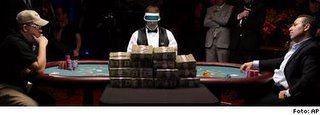Saturday, December 03, 2005
Institutions at risk - Moneymaker vs Farha
 Excerpt from dissertation text [introduction to institutions]: Institutions do matter, just like Alexander Hamilton noted in the hours before his duel with Aaron Burr. There would be a number of rational reasons for the inexperienced Hamilton to avoid facing Burr in a pistol duel. However, there was one argument he could not escape – the fact that a duel was an institutionalized way of solving a conflict between two men in the early days of the United States. Nobody would take Hamilton seriously if he fled from the arranged meeting.
Excerpt from dissertation text [introduction to institutions]: Institutions do matter, just like Alexander Hamilton noted in the hours before his duel with Aaron Burr. There would be a number of rational reasons for the inexperienced Hamilton to avoid facing Burr in a pistol duel. However, there was one argument he could not escape – the fact that a duel was an institutionalized way of solving a conflict between two men in the early days of the United States. Nobody would take Hamilton seriously if he fled from the arranged meeting.Not only do institutions matter, they also seem to be changing over time. Ever so often do these changes cause a severe impact on our decision-making ability.[i] Insitutions are game settings, rules for engagement, or restrictions (in the shape of laws or social conventions) put up by actors to define the forms of human interaction and help to limit the scope of decisions by establishing a norm system (North 1990a; Coleman 1994: 265; Klein 1999: 458; Rosenthal 1978). Institutions become important parts of the strategy in game theory models, especially when we analyze the way standardized patterns of decision-making, or focal points (Schelling 1960: 54-67, 89-111; Klein 1999: 460), can influence the games – and even more so when we notice how defection from these conventions can cause serious harm to opponents. Examples from the world of tournaments in various competitive games can give a good idea of just how big a part these institutions and strategies play. Excessive brinkmanship, though risky as it may be, can force institutions out of order. Let us look at two illustrative cases. First we have a poker tournament where everyone knows that the institution of the game holds that a player should fold a less strong hand to avoid getting beaten. Given this universal strategy set for a game, the institutionalized way of playing may be altered when someone is trying to fool other players into believing that he holds a much stronger hand: A poker player may bluff his way out of a situation which his opponent can not possibly predict (Bewersdorff 2005: 374-379[ii]; Packel 1981), like Chris Moneymaker against Sam Farha at the final table in the World Championship of Poker 2003. Moneymaker was the newcomer, a bold but inexperienced gambler who had never before participated in live poker and who qualified to the WSOP by winning a satellite tournament. Farha was the old-timer – known to be able to see through any bluff. When they were the last two remaining players at the final table Moneymaker went all-in on an impossible hand. Farha’s problem was that he had invested heavily already and would risk the championship by calling the bet. His whole cards did not give him any help in reading the situation. Deploying the risk-aversive strategy Farha decided to fold and in doing so let Chris Moneymaker into the game again (which he eventually won).
Another great example from the world of chess is the third game between Boris Spassky and Bobby Fischer in the 1972 title match for the World Championship of Chess in Reykjavik. Fischer, with black pieces, reinvented a classic Benoni defense and Spassky who was not prepared to face Fischer in this opening (an opening Fischer seldom played) was taken aback by his opponent’s lack of consistency (Edmonds and Eidinow 2005; Kasparov 2005: 336- 491). Fischer won the game (and later the match), to a certain extent by merely doing the unexpected.
[i] Professor Gerard Alexander from University of Virginia once gave me a great illustration of this when we were walking across Wyoming Avenue in the Adams Morgan neighborhood of Washington DC: “When Americans walk on the sidewalk and try to cross a busy street, all drivers are crazy and potentially hazardous vehicle owners. But as soon as they step into their own car, all pedestrians are transformed into an irresponsible crowd.”
[ii] “Bluffing in Poker: Can It be Done without Psychology?” Ch. 35 in Luck, Logic, & White Lies: The Mathematics of Games.



